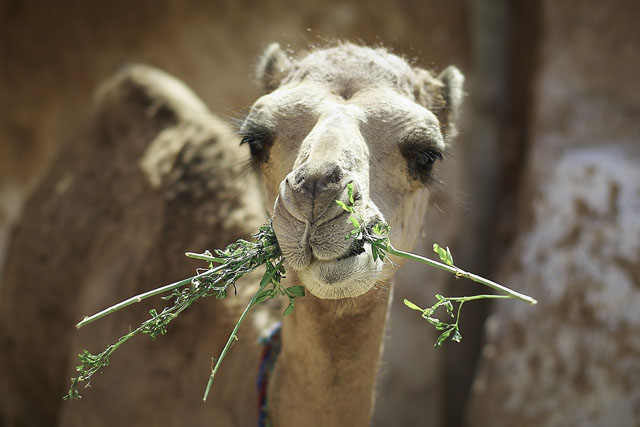What do camels eat? - Feeding of the camels: A comprehensive guide


- 1. Natural diet of camels
- 2. Vegetation and plants consumed by camels
- 3. Water intake and hydration needs
- 4. Adaptations for surviving in arid environments
- 5. Domesticated camels and their diet
- 6. Nutritional requirements and supplements
- 7. Feeding habits and foraging behavior
- 8. Impact of diet on camel health and well-being
- 9. Challenges and considerations for feeding camels
- 10. Conclusion: A balanced diet for healthy camels
1. Natural diet of camels
Camels are herbivorous animals, which means their diet consists mainly of plants and vegetation. In their natural habitat, camels have adapted to survive in arid and desert environments where food sources are limited. They have developed unique physiological and behavioral adaptations to cope with these harsh conditions.
2. Vegetation and plants consumed by camels
The natural diet of camels primarily consists of grasses, leaves, and desert plants. They are able to consume a wide variety of plants, including thorny bushes and dry shrubs, which most other animals cannot eat. Camels have a tough mouth and a specialized digestive system that allows them to break down and extract nutrients from these tough and fibrous plants.
3. Water intake and hydration needs
Camels are known for their ability to survive long periods without water. They have the remarkable ability to conserve water and rehydrate quickly when they do have access to it. A camel can drink up to 30 gallons of water in just 13 minutes. They can also tolerate high levels of dehydration, losing up to 25% of their body weight without suffering any ill effects.
4. Adaptations for surviving in arid environments
Camels have several adaptations that help them survive in arid environments. One of the most notable adaptations is their hump, which stores fat that can be metabolized for energy and water when food and water are scarce. The hump also helps to regulate body temperature. Camels also have long legs and wide, padded feet that allow them to walk on sand without sinking.
5. Domesticated camels and their diet
Domesticated camels have a similar diet to their wild counterparts. They are typically fed a diet of hay, grains, and other plant-based feeds. The specific diet may vary depending on the region and the purpose for which the camels are being raised. In some cases, domesticated camels may also be given supplements to ensure they are receiving all the necessary nutrients.
6. Nutritional requirements and supplements
Camels have specific nutritional requirements that need to be met in order for them to maintain good health. They require a diet that is high in fiber and low in protein. They also need adequate amounts of vitamins and minerals. In some cases, camels may require supplements to ensure they are getting all the necessary nutrients. These supplements may include vitamin and mineral powders or specially formulated camel feed.
7. Feeding habits and foraging behavior
Camels are selective feeders and will choose the most nutritious parts of plants to eat. They have a unique chewing motion that allows them to grind down tough plant material. Camels are also able to eat thorny plants without injuring themselves. They have a slow and deliberate feeding behavior, taking their time to chew and digest their food.
8. Impact of diet on camel health and well-being
The diet of camels plays a crucial role in their overall health and well-being. A balanced diet that meets their nutritional needs is essential for maintaining good health. A lack of proper nutrition can lead to various health issues, including weight loss, poor coat condition, and decreased immune function. It is important for camel owners and caretakers to provide a diet that meets the specific needs of their camels.
9. Challenges and considerations for feeding camels
Feeding camels can present some challenges, especially in arid environments where food sources may be limited. It is important to ensure that camels have access to a variety of plants and vegetation to meet their nutritional needs. Providing adequate water is also crucial, especially during hot and dry periods. Additionally, camels should be monitored for any signs of nutritional deficiencies or health issues related to their diet.
10. Conclusion: A balanced diet for healthy camels
In conclusion, the diet of camels consists mainly of plants and vegetation. They have adapted to survive in arid environments and can consume a wide variety of plants, including thorny bushes and dry shrubs. Camels have specific nutritional requirements that need to be met in order for them to maintain good health. Providing a balanced diet that meets these requirements, along with access to water, is essential for the well-being of camels.


Related posts